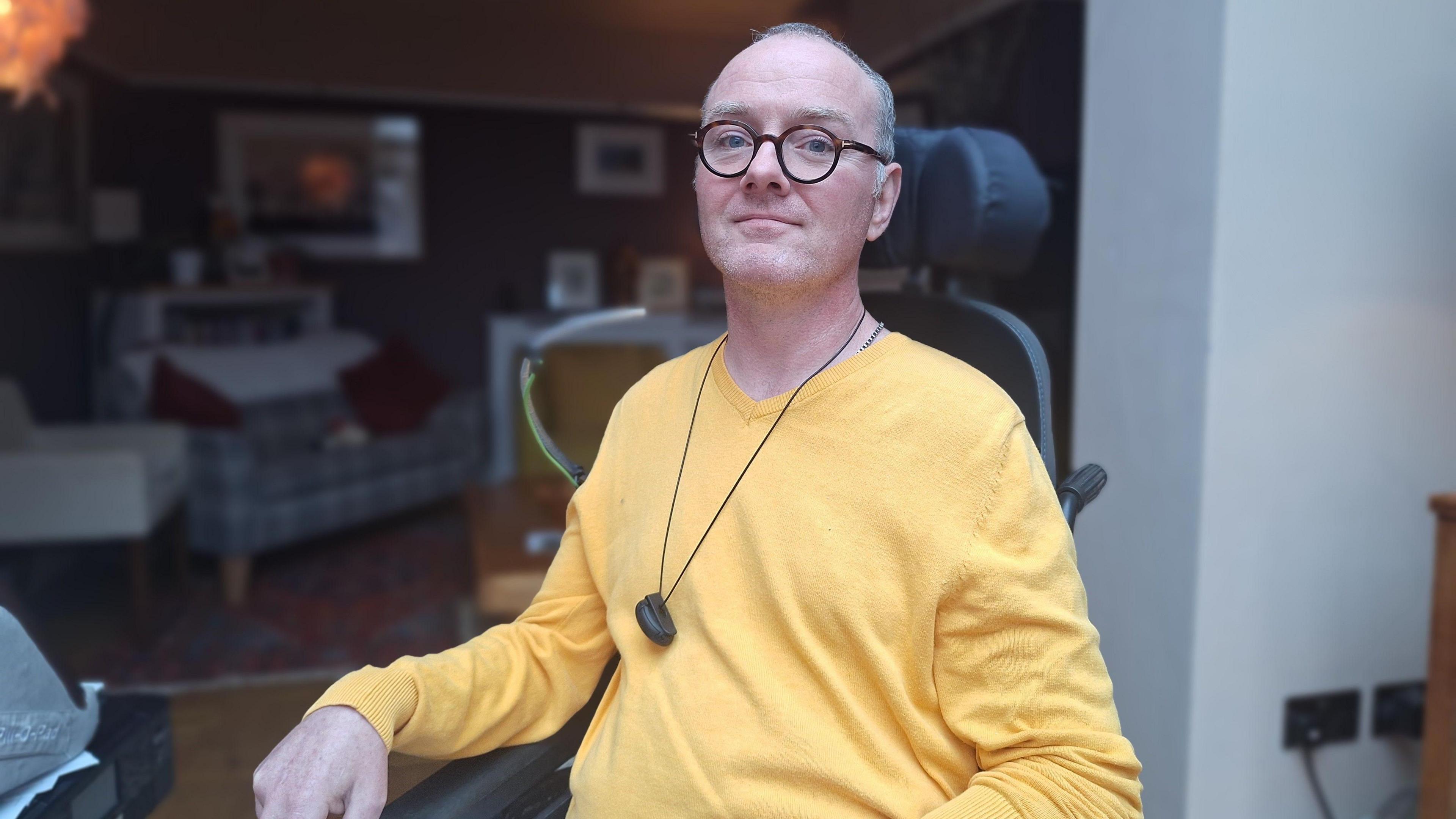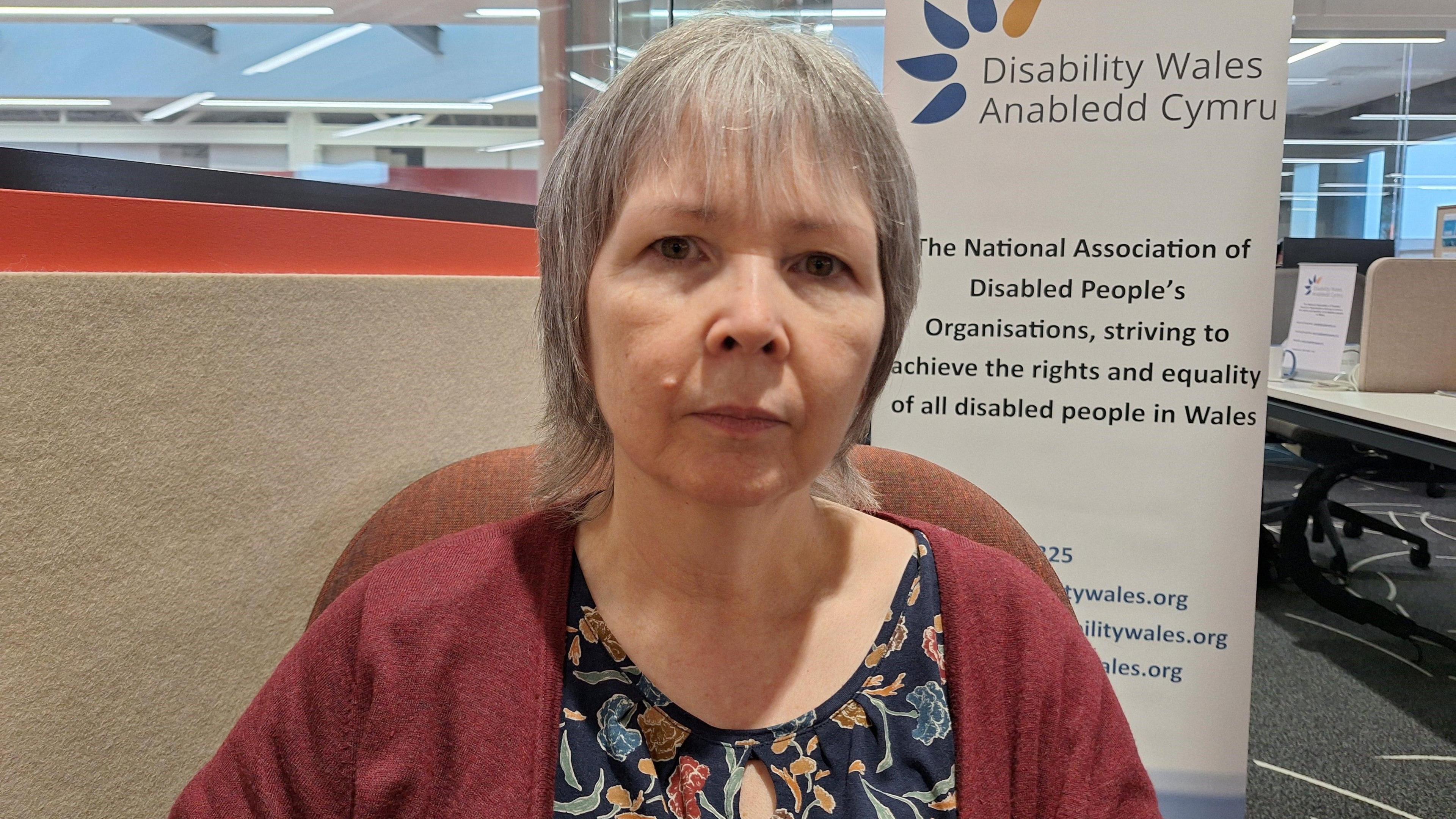Disabled man to sell home over care cost rise

Glyn Jones relies on carers for his everyday needs and currently pays the maximum of £100 a week
- Published
A disabled man has said he will have to sell his house to pay for care at home because of a planned rise in charges.
Glyn Jones, 50, currently pays the maximum of £100 per week for care, but the Welsh government is considering upping the weekly maximum to as much as £125 - an increase of £100 a month.
Disability Wales said it was "shocked and dismayed" and people were already struggling with costs.
The Welsh government said councils faced profound financial pressures.
Disabled man says council clawed back his savings. Video, 00:01:59
- Published15 February 2024
Woman too young for adapted home stuck in hospital
- Published26 October 2023
Accessibility issues 'make clubbing difficult'
- Published8 December 2023
Mr Jones, from Cardiff, retired five years ago because of advancing multiple sclerosis (MS) and is now a full-time wheelchair user.
He relies solely on carers to get him up, washed, dressed and to bed at night, and they also support him with eating, shopping and other errands.
He pays the maximum £100 per week, but the Welsh government is considering increasing this to £115, £120 or £125 a week.
"The cost of living is going up, food bills, electric, mortgage payments," he said.
"I’m not in a position where I can take on another job or ask for a pay rise because I’m a pensioner on a fixed income."
He said a "cold chill" went through him when he saw the proposals, saying there was no flexibility to pay up to an extra £100 per month.
He said the cost was manageable at current levels because of £400 in Personal Independence Payment benefit a month and a private pension from British Gas.
"The only way I can reduce my outgoings is to reduce my mortgage.
"The only way I can do that is to sell my house and move somewhere smaller," he said.
Mr Jones said he had been advised to sell his house, rent somewhere privately until his money ran out, tell the council he was homeless and then they could help him.
He said it was "crazy and a ridiculous way to live".
"It’s a gut punch. There’s no point saving anything because any savings you’ve got, you’re penalised for having, any assets you’ve got, you’re penalised for having."
The latest data from 2019 shows a third of adults who receive home care pay the maximum weekly charge.
How is home care paid for?
When adults are assessed for social care they also have a financial means test to see whether they should pay anything for their care
You may have to pay up to the maximum of £100 a week if you have a high level of disposable income and you have savings and investments over £24,000 – not including the value of your home
The current charge of £100 a week was set in 2020

Rhian Davies, chief executive of Disability Wales, says people are already struggling to pay for care
Rhian Davies, chief executive of Disability Wales, said she was dismayed at the plans.
“Members are already saying they’re struggling to pay charges. I was shocked that this was even being considered.”
She said 40% of disabled people in Wales lived in poverty, but were likely to have more outgoings than non-disabled people.
Ms Davies said people were having to cut back on food and energy costs which could make health conditions worse.
“An increase in care costs would deeply affect people and potentially will place more demand on the NHS, because one option is people opting out of social care and then ending up in a worse situation.”
She also refuted the suggestion poorer people would be protected by the minimum income allowance – the amount of money people are allowed to keep before they pay for home care - as the amount has not been reviewed since 2007.

Alwyn Jones says the increase in fees is necessary due to a forecasted budget gap of £646m
The Welsh Local Government Association (WLGA) and The Association of Directors of Social Services (ADSS) Cymru have forecast a budget gap of £646m over the next three years.
Alwyn Jones, the president of ADSS Cymru, said he understood the increase in fees was a difficult thing to accept but it was necessary.
"We have a social care and an entire local authority system that is under significant strain with costs and demand increasing," he said.
"We need to ensure collectively that we have the wherewithal to provide a comprehensive range of services for everyone.
"I think it’s reasonable that the charges for home care increase in line with other aspects and actually supports the council’s overall position."
The Welsh government said councils faced profound financial pressures as a result of persistently high inflation and rising demand.
A spokesperson added: "Our settlement, which comes mainly in the form of a block grant from the UK government is not sufficient to respond to all the pressures public services are facing."
It said it must "carefully consider" the cases for and against raising charges and said it had launched a consultation.
The UK government said it had provided the Welsh government with its largest amount of funding since devolution and "it must ultimately answer to the Senedd and the people of Wales on how it chooses to fund services".
The consultation on the proposals ends in May.
Related topics
- Published2 January 2024

- Published5 July 2023

- Published24 October 2023
